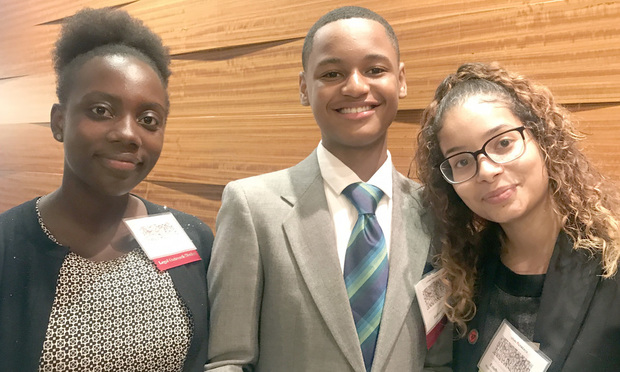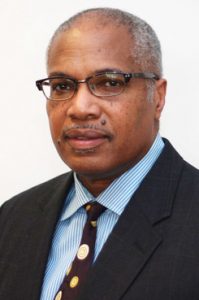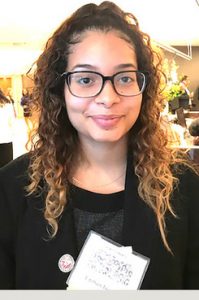How Legal Outreach in New York Serves Students in the 'Forgotten Middle'
The organization provides an invaluable service to an underserved New York City community: young people with a passion, a dream and not enough opportunity.
November 08, 2019 at 09:39 AM
5 minute read
 Jessica Sotindjo (from left), Richard Minor and Estefhani Tavarez.
Jessica Sotindjo (from left), Richard Minor and Estefhani Tavarez.
We hear a lot about programs geared to help top students from underserved backgrounds. But what happens to those kids who don't make it in the top 10% of their class—the overlooked students in the "forgotten middle?"
That's where Legal Outreach comes in. The organization provides an invaluable service to an underserved New York City community: young people with a passion, a dream and not enough opportunity.
 James B. O'Neal.
James B. O'Neal.Legal Outreach was founded in 1982 by attorney James O'Neal, currently the executive director. The organization provides guidance, mentoring and a path to success, using the field of law to attract at-risk junior-high students. The program, which works with students from eighth to 12th grade, teaches young people about rights and responsibilities and how the law can be used as a tool to help improve the quality of life in their communities, O'Neal said. It also helps students develop writing, reasoning, public speaking, listening and critical thinking skills, which are essential for performing well in high school, college and beyond, he said. In addition, the program seeks to inspire many of them to pursue careers within the legal profession.
How the Legal Outreach program works: Legal Outreach finds students by presenting a law-related lesson to eighth-graders within about 30 middle schools in underserved communities in New York City. The students who exhibit an interest in the program are then invited to apply to one of seven Summer Law Institutes that Legal Outreach implements with seven host law schools in New York: Brooklyn Law School, Benjamin N. Cardozo School of Law, Columbia Law School, City University of New York School of Law, Fordham University School of Law, New York University School of Law, and St. John's University School of Law. At the Institute, the students are introduced to legal professionals and they learn about the criminal justice process. Students also take field trips and are introduced to trial practice skills, and they participate in skill-building activities. At the end of the Institute's session, they have the opportunity to apply to College Bound, Legal Outreach's after-school continuation program that meets every summer of their high school years from ninth through the 12th grades.
The stats prove that the Legal Outreach mission is successful. Since 1993, the year Legal Outreach graduated its first class of College Bound Program with six students, 776 students have completed the four-year program, with 99% attending college and 97% four-year colleges, O'Neal said. More than 90% have graduated from those colleges. Fifty-five Legal Outreach graduates have also attended 29 different law schools, including Harvard Law School, University of Pennsylvania Law School, Penn State Law, New York Law School and others.
Legal Outreach is funded by various sources including private educational foundations, corporations and law firms, and individual donors.
Last spring, Legal Outreach hosted an event at Reed Smith's New York office for students and alumni. Here's what some of them had to say.
Annys Bai, a 23-year-old graduate of Mt. Holyoke College: "The program has allowed me to rub elbows with professionals where I normally wouldn't have had the ability or the connections. It's taught me how to be an adult in a society I didn't know how to navigate."
Michael Chung, a senior at the University of Rochester, when asked what the best thing about Legal Outreach was, he said, "It's free!" He continued, "My dad is a taxi driver and my mom's a pedicurist. My parents work endlessly, and we still can't afford a lot of things, Legal Outreach provides free SAT prep, writing classes, amazing mentorship and a stipend!"
 Estefhani Tavarez
Estefhani TavarezEstephanie Tavarez, a junior at Mt. Holyoke, is inspired. "Because of my experience with Legal Outreach, I have an idea to create my own scholarship, mostly for students of color who can't really afford to go to college. It would be a small scholarship, but it's through the inspiration of the program that I want to give back and be as involved as possible. I want to make a change within the community. I want to practice corporate law, but I will definitely do pro bono work too."
Richard Minor, a 15-year-old from Queens, said: "Legal Outreach gives me a different professional perspective on the future. Like, where I come from people are either going for sports or music, and this program gives me a different way out. And each internship teaches me something different."
Jessica Sotindjo, 17, started with Legal Outreach in eighth grade. She appreciates the study skills Legal Outreach has given her. "I never used to study much, because I got good grades, but Legal Outreach taught me to organize my time, study better, so I can ultimately achieve my goals."
While these young people are not at the top of the class, and many of them start without the confidence to shine or be recognized, through Legal Outreach, they represent the excellence in the rest of us.
This content has been archived. It is available through our partners, LexisNexis® and Bloomberg Law.
To view this content, please continue to their sites.
Not a Lexis Subscriber?
Subscribe Now
Not a Bloomberg Law Subscriber?
Subscribe Now
NOT FOR REPRINT
© 2025 ALM Global, LLC, All Rights Reserved. Request academic re-use from www.copyright.com. All other uses, submit a request to [email protected]. For more information visit Asset & Logo Licensing.
You Might Like
View All
What Qualities Will Distinguish Good from Great Service In 2025?

Trending Stories
- 1Attorney Sanctioned $9K for Revealing Nude Photos, Other Info in Court Filing
- 2Shifting Battlegrounds in Administrative Law, From Biden to Trump II
- 3Bar Report - Jan. 13
- 4Newsmakers: Robert Collins, Barron Wallace Elected to Bracewell’s Management Committee
- 5Navigating the Shifting Sands of E-Discovery and Information Governance in 2025
Who Got The Work
Michael G. Bongiorno, Andrew Scott Dulberg and Elizabeth E. Driscoll from Wilmer Cutler Pickering Hale and Dorr have stepped in to represent Symbotic Inc., an A.I.-enabled technology platform that focuses on increasing supply chain efficiency, and other defendants in a pending shareholder derivative lawsuit. The case, filed Oct. 2 in Massachusetts District Court by the Brown Law Firm on behalf of Stephen Austen, accuses certain officers and directors of misleading investors in regard to Symbotic's potential for margin growth by failing to disclose that the company was not equipped to timely deploy its systems or manage expenses through project delays. The case, assigned to U.S. District Judge Nathaniel M. Gorton, is 1:24-cv-12522, Austen v. Cohen et al.
Who Got The Work
Edmund Polubinski and Marie Killmond of Davis Polk & Wardwell have entered appearances for data platform software development company MongoDB and other defendants in a pending shareholder derivative lawsuit. The action, filed Oct. 7 in New York Southern District Court by the Brown Law Firm, accuses the company's directors and/or officers of falsely expressing confidence in the company’s restructuring of its sales incentive plan and downplaying the severity of decreases in its upfront commitments. The case is 1:24-cv-07594, Roy v. Ittycheria et al.
Who Got The Work
Amy O. Bruchs and Kurt F. Ellison of Michael Best & Friedrich have entered appearances for Epic Systems Corp. in a pending employment discrimination lawsuit. The suit was filed Sept. 7 in Wisconsin Western District Court by Levine Eisberner LLC and Siri & Glimstad on behalf of a project manager who claims that he was wrongfully terminated after applying for a religious exemption to the defendant's COVID-19 vaccine mandate. The case, assigned to U.S. Magistrate Judge Anita Marie Boor, is 3:24-cv-00630, Secker, Nathan v. Epic Systems Corporation.
Who Got The Work
David X. Sullivan, Thomas J. Finn and Gregory A. Hall from McCarter & English have entered appearances for Sunrun Installation Services in a pending civil rights lawsuit. The complaint was filed Sept. 4 in Connecticut District Court by attorney Robert M. Berke on behalf of former employee George Edward Steins, who was arrested and charged with employing an unregistered home improvement salesperson. The complaint alleges that had Sunrun informed the Connecticut Department of Consumer Protection that the plaintiff's employment had ended in 2017 and that he no longer held Sunrun's home improvement contractor license, he would not have been hit with charges, which were dismissed in May 2024. The case, assigned to U.S. District Judge Jeffrey A. Meyer, is 3:24-cv-01423, Steins v. Sunrun, Inc. et al.
Who Got The Work
Greenberg Traurig shareholder Joshua L. Raskin has entered an appearance for boohoo.com UK Ltd. in a pending patent infringement lawsuit. The suit, filed Sept. 3 in Texas Eastern District Court by Rozier Hardt McDonough on behalf of Alto Dynamics, asserts five patents related to an online shopping platform. The case, assigned to U.S. District Judge Rodney Gilstrap, is 2:24-cv-00719, Alto Dynamics, LLC v. boohoo.com UK Limited.
Featured Firms
Law Offices of Gary Martin Hays & Associates, P.C.
(470) 294-1674
Law Offices of Mark E. Salomone
(857) 444-6468
Smith & Hassler
(713) 739-1250










